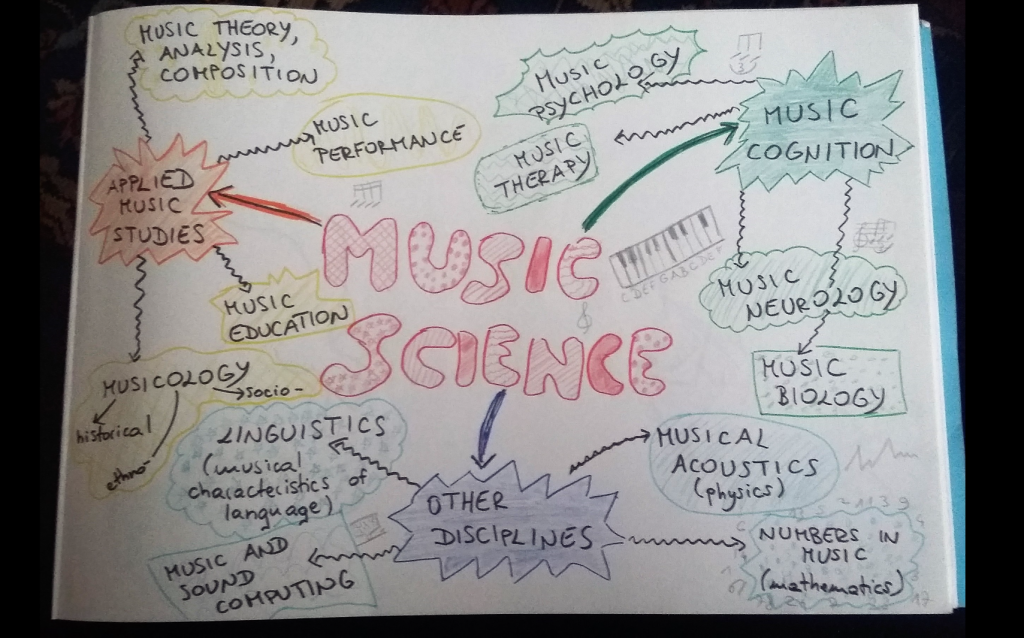Or introducing colours to the world of music
Recently, while sitting on the couch, I started thinking about the many branches that the scientific study of music appears to encompass. Everybody in the field(s) seems to implicitly understand the different aspects, but no one writes about them. This was, I realized, one of the reasons why I held so much wonder at the beginning, when I started discovering the many sides of the music science equation. That day, I grabbed my sketchbook* and outlined the following mind map (to which I later added colours, because my life needs a splash of rainbow).

Music science mind map.
With help of what I’ve read so far and, naturally, the internet, I wished to provide a clearer overview of what you can study if you wish to study music in any shape, form or size. As you can, it can be connected to nearly every discipline, and not necessarily the ones you’d expect at the first glance. I split them into categories of (1) Music cognition, (2) Other disciplines, and (3) Applied music studies.** So without further ado, see below for explanations.
Music cognition
Much like cognition refers to nearly anything connected to the mind, brain, and thinking and perception processes in general, so we can find many different parts of music cognition. This includes:
- Music psychology – a thriving field that combines musicology with psychology, and studies musical behaviour and experience)
- Music neurology (or the neuroscience of music) – refers to studies of brain in connection to musical cognitive processes.
- Music biology – encompasses all biological and anatomical processes connected to doing and/or perceiving music.
- Music therapy – the practical application of everything learned by music cognition, helping people get better through the “healing powers of music”.
Other disciplines
There is barely a discipline that can not be connected to music in some way. The following, however, are the ones that have spread most widely in the past few decades of research:
- Linguistics – music and language have a lot in common, both biologically and pragmatically, so it is not surprising that by studying one you can learn a lot about the other.
- Music and sound computing – unsurprising for today’s day and age, sound and computing are strongly connected, mostly through programming (for example designing new music programs or producing digital audio.
- Physics – the most physical (hah, see what I did there?) of music-related disciplines is acoustics, which deals with all aspects of sounds (including reception, production, effects, and so on).
- Mathematics – there’s beauty in numbers and beauty in music, and there are people who combine both, for example by looking at pitch or tuning or even composing with maths.
Applied music studies
This part does not concern music science, per se, but rather serves to remind us that above all, music is part of our lives in a very practical way.
- Music theory, analysis, and composition study (and re-create) practices of music.
- Music performance gives life to music and joy to the world.
- Music education benefits everyone who undertakes it, but is sadly not always possible (and rarely turns out to be a career choice)
- Musicology studies music and its societal effects in practice, making sure that musical practices across the world are well-documented (ethno-musicology), that we know how music developed and functioned throughout the years (historical musicology), and that we know of the impact of music in today’s society (socio-musicology).
To be continued …
In time, my plan is to make increasingly detailed mind-maps (and general posts) about the first two points, with hopes of being helpful to someone in the future; but mostly doing it so that I can remember as I learn. It is a thriving field, and if I can help at least one person discover it earlier than I did, then my job here is done.
*A fancy word, especially for someone who decided to learn how to draw barely a month ago and whose drawings look kindergarten-appropriate.
**I expect my understanding of this will change with time, and I look forward to it. If you find any mistakes, you are more than welcome to write to me.
Note: This article was first published on a previous, free, version of my blog called scienceofmusic and has since been deleted.

